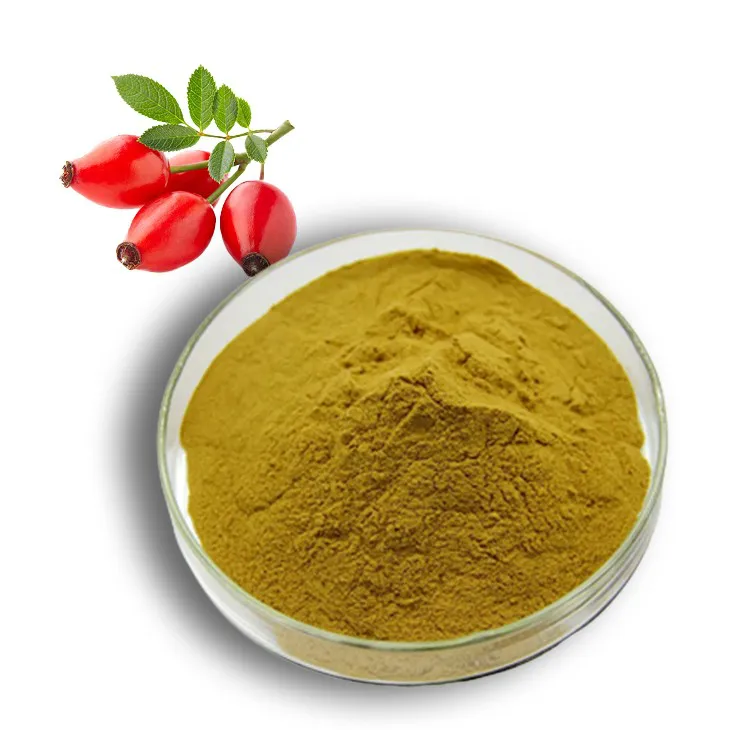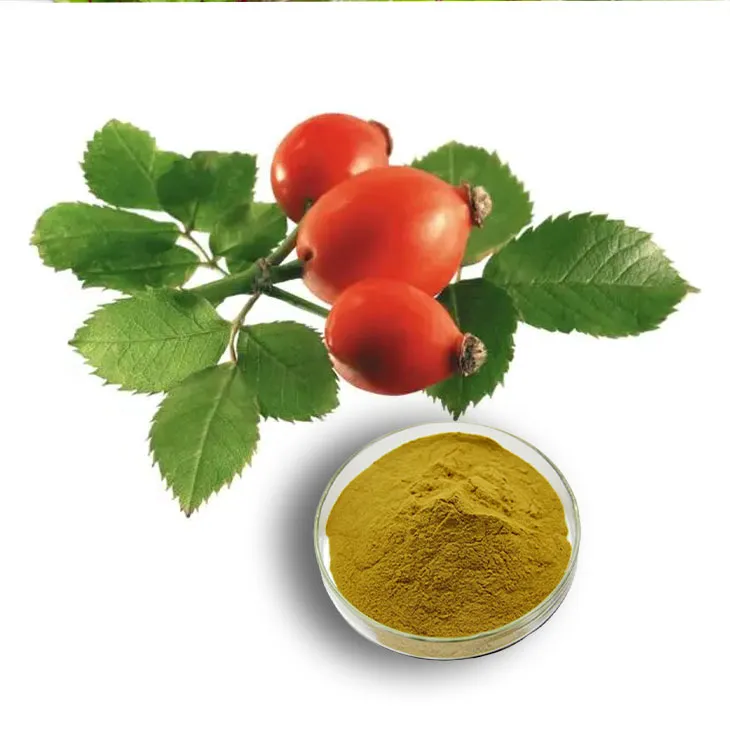- 0086-571-85302990
- sales@greenskybio.com
5 Benefits of Rose Hip Extract + Dosage, Side Effects
2024-11-14

1. Introduction
Rosehip extract has been steadily gaining recognition in the world of natural remedies and health supplements. Derived from the fruit of the rose plant, it is a rich source of vitamins, antioxidants, and other bioactive compounds. This article aims to provide a comprehensive exploration of the five major benefits of rosehip extract, along with information regarding its appropriate dosage and potential side effects.

2. Antioxidant Properties
What are antioxidants? Antioxidants are substances that can prevent or slow damage to cells caused by free radicals. Free radicals are unstable molecules that are produced in the body during normal metabolic processes, as well as due to environmental factors such as pollution and radiation.
How does rosehip extract act as an antioxidant? Rosehip extract contains high levels of vitamin C, carotenoids, and flavonoids. Vitamin C is a well - known antioxidant that helps to neutralize free radicals in the body. Carotenoids, such as beta - carotene, and flavonoids also have antioxidant properties. These compounds work together to scavenge free radicals, reducing oxidative stress in the body.
Benefits of antioxidant activity By reducing oxidative stress, rosehip extract can potentially help in preventing various chronic diseases. Oxidative stress has been linked to conditions such as heart disease, cancer, and neurodegenerative diseases. Antioxidants in rosehip extract may also help in maintaining healthy skin by protecting skin cells from damage, which can lead to premature aging.

3. Anti - Inflammatory Effects
The role of inflammation in the body Inflammation is a natural response of the body's immune system to injury or infection. However, chronic inflammation can be harmful and is associated with many diseases, including arthritis, diabetes, and inflammatory bowel disease.
Rosehip extract and inflammation Rosehip extract contains anti - inflammatory compounds such as polyphenols. These compounds can inhibit the production of inflammatory mediators in the body, such as cytokines and prostaglandins. Studies have shown that rosehip extract can be effective in reducing inflammation in patients with rheumatoid arthritis, for example.
Potential applications in treating inflammatory conditions In addition to arthritis, rosehip extract may also have potential in treating other inflammatory conditions. It could potentially be used as a complementary therapy in the management of diabetes - related inflammation or in reducing inflammation in the gut for those with inflammatory bowel disease.

4. Skin - Improving Effects
How rosehip extract benefits the skin The antioxidant and anti - inflammatory properties of rosehip extract make it beneficial for the skin. It can help to protect the skin from environmental damage, reduce redness and inflammation, and promote skin healing. Rosehip extract is also rich in essential fatty acids, such as omega - 3 and omega - 6 fatty acids, which are important for maintaining skin barrier function and hydration.
Use in skin care products Rosehip extract is a popular ingredient in many skin care products, including creams, serums, and oils. It can be used to address various skin concerns, such as dryness, wrinkles, and acne. For example, its ability to promote skin regeneration may help in reducing the appearance of scars and fine lines.
Oral consumption for skin health In addition to topical application, oral consumption of rosehip extract may also have benefits for skin health. The nutrients in rosehip extract can be absorbed into the bloodstream and reach the skin cells from the inside, providing a more comprehensive approach to skin improvement.
5. Immune - Boosting Properties
The immune system and its importance The immune system is responsible for protecting the body against harmful pathogens, such as bacteria, viruses, and fungi. A strong immune system is essential for overall health and well - being.
How rosehip extract boosts the immune system Rosehip extract contains vitamins and minerals that are important for immune function, such as vitamin C, vitamin A, and zinc. Vitamin C, in particular, is known for its immune - boosting properties. It can stimulate the production of white blood cells, which are the body's main defense against infections.
Benefits in preventing and fighting infections By strengthening the immune system, rosehip extract can help the body to better resist infections. It may be particularly useful during the cold and flu season or in situations where the immune system is compromised, such as in the elderly or those with chronic diseases.
6. Joint - Supporting Effects
Joint health and common problems Joints are essential for movement, but they are also prone to problems such as arthritis, osteoarthritis, and joint pain. These conditions can cause pain, stiffness, and reduced mobility.
Rosehip extract for joint health Rosehip extract has been shown to have beneficial effects on joint health. Its anti - inflammatory properties can help to reduce joint inflammation, while its antioxidant properties can protect the joint tissues from damage. Some studies have also suggested that rosehip extract may help in improving joint function and reducing pain in patients with osteoarthritis.
Long - term use for joint maintenance For those with joint problems or those who want to maintain healthy joints, long - term use of rosehip extract may be beneficial. It can be used as a natural alternative or complementary therapy to traditional medications for joint pain and arthritis.
7. Dosage of Rose Hip Extract
Recommended daily dosage The recommended daily dosage of rosehip extract can vary depending on the form of the extract (e.g., powder, capsule, or tincture) and the intended use. In general, for general health benefits, a dosage of 1 - 2 grams of rosehip powder per day may be sufficient. However, for more specific conditions such as arthritis, higher dosages may be required under the guidance of a healthcare professional.
Factors affecting dosage Factors such as age, weight, and overall health can also affect the appropriate dosage of rosehip extract. For example, elderly individuals or those with compromised immune systems may require a different dosage compared to healthy adults. Additionally, if rosehip extract is being used in combination with other medications or supplements, it is important to consult a healthcare provider to ensure there are no interactions.
8. Side Effects of Rose Hip Extract
Common side effects Rosehip extract is generally considered safe for most people when taken in appropriate dosages. However, some people may experience mild side effects such as stomach upset, nausea, or diarrhea. These side effects are usually temporary and can often be alleviated by reducing the dosage or taking the extract with food.
Allergic reactions Although rare, some individuals may be allergic to rosehip extract. Allergic reactions can range from mild symptoms such as skin rashes and itching to more severe symptoms such as difficulty breathing or swelling of the face, lips, or tongue. If any signs of an allergic reaction occur, it is important to stop using the extract immediately and seek medical attention.
Interactions with medications Rosehip extract may interact with certain medications. For example, it may interact with blood - thinning medications, as it contains vitamin K, which can affect blood clotting. It is crucial to inform your healthcare provider if you are taking any medications before starting to use rosehip extract.
9. Conclusion
Rosehip extract offers a wide range of potential benefits, including antioxidant, anti - inflammatory, skin - improving, immune - boosting, and joint - supporting effects. However, it is important to use it in the appropriate dosage and be aware of the potential side effects. As with any supplement, it is advisable to consult a healthcare professional before starting to use rosehip extract, especially if you have underlying health conditions or are taking other medications.
FAQ:
What are the antioxidant benefits of Rose Hip Extract?
Rose hip extract contains high levels of antioxidants such as vitamin C, carotenoids, and flavonoids. These antioxidants help combat free radicals in the body. Free radicals are unstable molecules that can damage cells and contribute to various diseases and aging processes. By neutralizing free radicals, the antioxidants in rose hip extract can protect cells from oxidative stress, support overall health, and potentially reduce the risk of chronic diseases like heart disease and cancer.
How does rose hip extract act as an anti - inflammatory?
Rose hip extract has anti - inflammatory properties due to the presence of compounds like polyphenols. These substances can inhibit the production of inflammatory mediators in the body. When there is inflammation, the body releases chemicals that cause pain, swelling, and redness. By reducing the production of these inflammatory chemicals, rose hip extract can help relieve inflammation in conditions such as arthritis, and may also have a positive impact on reducing general inflammation in the body which is associated with many health issues.
What skin - improving effects does rose hip extract offer?
The vitamin C and essential fatty acids in rose hip extract are beneficial for the skin. Vitamin C is important for collagen synthesis, which helps keep the skin firm and elastic. The essential fatty acids help to moisturize the skin and improve its barrier function. This can lead to a reduction in wrinkles, improvement in skin texture, and a more youthful appearance. Additionally, it may also help in treating skin conditions like eczema and psoriasis by reducing inflammation and promoting skin healing.
How does rose hip extract boost the immune system?
Rose hip extract is rich in nutrients like vitamin C, which is well - known for its immune - boosting properties. Vitamin C helps stimulate the production and function of white blood cells, which are the body's main defense against infections. It also has antioxidant effects that protect immune cells from damage. By providing these immune - enhancing nutrients, rose hip extract can strengthen the body's immune system, making it more resistant to viruses, bacteria, and other pathogens.
What are the joint - supporting effects of rose hip extract?
The anti - inflammatory properties of rose hip extract play a significant role in joint support. Inflammatory conditions in joints, such as rheumatoid arthritis and osteoarthritis, can cause pain and reduced mobility. By reducing inflammation, rose hip extract can help relieve joint pain. Additionally, it may also contribute to the maintenance of healthy cartilage in the joints. Some studies suggest that the nutrients in rose hip extract can support the repair and regeneration of joint tissues over time.
What is the proper dosage of rose hip extract?
The proper dosage of rose hip extract can vary depending on factors such as the form of the extract (e.g., capsules, powder, or tincture) and the intended use. In general, for a standard rose hip extract supplement, a daily dosage of 500 - 1000 mg is often recommended. However, it is always best to follow the instructions on the product label or consult a healthcare provider, especially if you have any underlying health conditions or are taking other medications.
Are there any side effects of rose hip extract?
While rose hip extract is generally considered safe for most people, some individuals may experience side effects. These can include gastrointestinal issues such as nausea, vomiting, or diarrhea, especially if taken in large amounts. In rare cases, allergic reactions may occur, particularly in people who are sensitive to plants in the Rosaceae family. If any adverse reactions occur after taking rose hip extract, it is advisable to stop use and consult a doctor.
Related literature
- The Antioxidant and Anti - Inflammatory Properties of Rose Hip Extract: A Review"
- "Rose Hip Extract for Skin Health: Clinical Evidence and Mechanisms"
- "Immune - Boosting Effects of Rose Hip: A Comprehensive Study"
- "Joint Support with Rose Hip Extract: An Overview of Scientific Research"
- ▶ Hesperidin
- ▶ Citrus Bioflavonoids
- ▶ Plant Extract
- ▶ lycopene
- ▶ Diosmin
- ▶ Grape seed extract
- ▶ Sea buckthorn Juice Powder
- ▶ Fruit Juice Powder
- ▶ Hops Extract
- ▶ Artichoke Extract
- ▶ Mushroom extract
- ▶ Astaxanthin
- ▶ Green Tea Extract
- ▶ Curcumin
- ▶ Horse Chestnut Extract
- ▶ Other Product
- ▶ Boswellia Serrata Extract
- ▶ Resveratrol
- ▶ Marigold Extract
- ▶ Grape Leaf Extract
- ▶ New Product
- ▶ Aminolevulinic acid
- ▶ Cranberry Extract
- ▶ Red Yeast Rice
- ▶ Red Wine Extract
-
Jujube Extract
2024-11-14
-
Saponin Extract
2024-11-14
-
Bitter Melon Extract
2024-11-14
-
White Willow Bark Extract
2024-11-14
-
American Ginseng Root Extract
2024-11-14
-
Angelica sinensis extract
2024-11-14
-
Almond Extract Powder
2024-11-14
-
Nettle leaf extract
2024-11-14
-
Panax Ginseng Leaf Extract
2024-11-14
-
Citrus bioflavonoids
2024-11-14





















